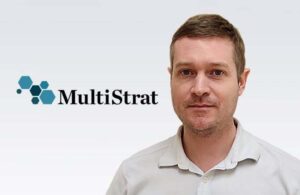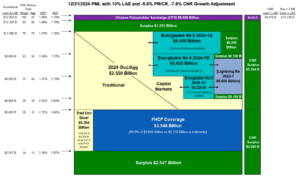What does it take to make a brokerage grow – and fast?
Paul: [00:00:11] Hello everyone, and welcome to the latest edition of Insurance Business TV. Now, often on this program, we’re inviting insurers and MGAs to share their knowledge with brokers. But what about hearing from an actual brokerage and one that is absolutely thriving at that? Yes. Earlier this year, insurance business America launched its fast brokerage reports shining the spotlight on the companies that have enjoyed extensive growth over the last two years. Now, I’m delighted to say I am joined by the president of one of those rapidly expanding and award winning brokerages. That man is Greg Zimmer of Alliant Insurance. Greg, welcome to IBTV.
Greg: [00:00:51] Thank you, Paul. Real pleasure to be here this morning.
Paul: [00:00:54] So, Greg, your company has been named as one of IBA’s fast brokerages. Tell us a little bit about how you’ve enjoyed that rapid growth. It seems that acquisitions have been a big part of your strategy.
Greg: [00:01:06] Well, it’s interesting, Paul. When we think about when we think about the growth and when we think about Alliant, one of the beauties of Alliant is our organic growth is always at the top of the charts. So we start with organic growth and we can get into that later on how we do it and why we do it. And then really, we’ve always viewed acquisitions as complementary to that, to that organic growth. So so we’re not an acquisition focused business. We’re much more of an organic growth business and where we use acquisitions in a strategic manner to complement that very strong organic growth.
Paul: [00:01:48] Well. Can you expand on that a little bit for me, Greg, if you don’t mind? I mean, give us a little bit of an insight here into what you’re actually looking for when you’re going to make one of those acquisitions.
Greg: [00:01:58] Absolutely. So when you look at the when you take a step back and look at Alliant, there are basically three components to the business. We have our retail property casualty piece. We have our employee benefits piece and we have our MGA. So we’re really looking into three different marketplaces for opportunities. Again, strategic opportunities from an acquisition perspective that we really believe will be additive to that existing business. So we’re by no means a serial acquirer. We’re not looking to make a million acquisitions. We’re really looking for those acquisitions that fit into our overall strategy and have all of the right components. They have the right leadership, they have the right cultural fit. They they’re an equity based culture or they want to be an equity based culture. So there’s a number of metrics that we look at and benchmarks that we look for. I think it’s fair to say we’re very disciplined and we’re very selective from our acquisition perspective. But the good news from all of that is they work. So these businesses thrive once they become part of Alliant because we do the heavy lifting and the hard work to determine whether or not we think they will be a success within our business prior to acquiring them.
Paul: [00:03:18] And you said that, of course, the most important aspect is that the acquisition actually works, but of course, it’s got to work on both sides. So what tips would you give to a business that may be considering being acquired? So how would they know that your firm or indeed any firm is the right one?
Greg: [00:03:36] Well, it’s a great question and. There’s a lot of choices out there for sellers of insurance brokerage businesses, and I think it would, in my opinion, they should really take the time to learn more about the different businesses out there because it’s not a commodity. Each business, each buyer of brokers really is different, some of them different on the margins, some of them different, just clearly fundamentally different. But, you know, at the end of the day, as a seller of the business, you always need to remember that that’s where you’re going to work the next day. So what is this? What is your acquirer not only going to do for you, but really in many ways more importantly, what is it going to do for your people? What is it going to do for your clients? What is it going to do for your existing and new career relationships? And those are the questions, in my opinion, that sellers of brokerage companies should be asking. It should be far more about what is this? What is the buyer going to do for me and my people? More so than what’s the price of the business or what’s the valuation? That’s always important. And I think all of us know that are in this business of buying businesses that we need to be competitive. But it’s all of those other things that at the end of the day really create long term satisfaction on the parts of a seller.
Paul: [00:05:10] Yeah, and I think that’s that’s great advice. And moving on if we can, I mean, we talked about acquisitions there, but your company as well also has a big focus on organic growth. I mean, that’s been a key to you to winning this award as a fast brokerage. So tell us how you’ve achieved that organic growth.
Greg: [00:05:29] Well, we fundamentally have a different business model. So our business model is extremely what I will call broker centric. So our focus corporately is on our brokers. And what I mean by that is providing our brokers with an environment that where they can thrive and that range is everywhere from having competitive compensation to providing them equity opportunities. So they’re owners in the business and then providing them unique services and products that they can only get if they’re part of Alliant. So by providing all of that to our brokers, we keep our brokers and we keep our brokers happy and we keep our brokers thriving. And if we have a happy broker, then we have a happy client. So we view ourselves as very broker centric and we leave it with our brokers to be extremely client centric. And that formula has worked very, very well for us for many, many years, really, over the last 25 years. This is not our organic growth. And growth overall is nothing new. You know, we’ve been growing dramatically over the last 25 years. So it’s we feel very strongly that it’s it’s a model that is sustainable well into the future.
Paul: [00:06:56] And if you don’t mind, Greg, just one last question I’d like to throw at you, because you you talk to the quite extensively about having this broker focused approach. But if you don’t mind me saying as well, I’m well aware that your business also describes itself as having an entrepreneurial approach. So can you give us a little bit more detail on exactly what you mean by that?
Greg: [00:07:15] Absolutely. Let’s start with we’re an equity based culture, so all of our brokers are owners in the business. And I and for many people, that’s really key to them. They want to be more than just an employee. They want to be an owner in a business that our platform provides that for our brokers. So still today, even at our size, the vast majority of our business is still owned by our own employees, by our own brokers. So let’s start there. That’s a really, really big part of it. And then let’s move to how we manage the business. We, by design, work really, really hard to keep it extremely flat. We try to keep layers of management out of the out of the equation, give brokers an environment where they feel that they have power, that they’re empowered to go out and be creative on how they run their own business. And and that’s really that’s really I would say those two areas, more so than any, are really our keys to success and why our brokers feel like they’re very much in an entrepreneurial environment.
Paul: [00:08:32] Greg, fantastic to hear from you. Without a doubt, Alliant is going to keep growing from here. Best of luck in the next stages of that rapid progress. And to everybody watching. Thank you for joining us. And we’ll see you next time here on Insurance Business TV.






